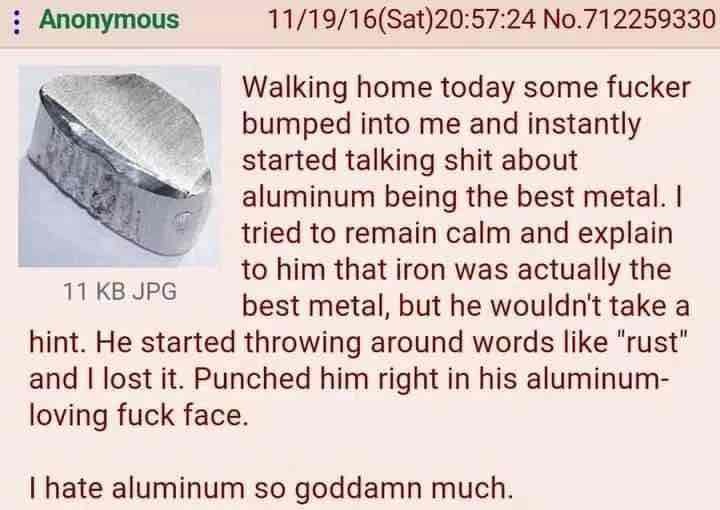this post was submitted on 05 May 2024
799 points (96.7% liked)
Greentext
4235 readers
942 users here now
This is a place to share greentexts and witness the confounding life of Anon. If you're new to the Greentext community, think of it as a sort of zoo with Anon as the main attraction.
Be warned:
- Anon is often crazy.
- Anon is often depressed.
- Anon frequently shares thoughts that are immature, offensive, or incomprehensible.
If you find yourself getting angry (or god forbid, agreeing) with something Anon has said, you might be doing it wrong.
founded 1 year ago
MODERATORS
you are viewing a single comment's thread
view the rest of the comments
view the rest of the comments

Yeah but like, in order to get significant amounts of it you gotta be in a relatively harsh environment.
You get a lot of it at sea. Not supposed to polish it off though, because the aluminum oxide acts as a barrier to further corrosion, whereas iron oxide flakes and continually exposes fresh surface.
Yeah I imagine you would. Salty water loves to eat things up.
Dunno how harsh a warehouse is. We used to get oxidized stuff for our presses a lot
It depends on what's in the warehouse. The only place I've seen significant aluminum corrosion was inside a vac frame hood with years of corrosive fumes in it. But, I'm sure there's a middle ground. Aluminum isn't inert, but it's better than raw iron at resisting corrosion.
Really depends on the grade of material. Aluminum has several different grades of varying hardness, ductility, resistance. Same as steel. Corrosion is the bane of most usable metals and industries are constantly researching methods to fight it
Yeah that's true, metal to metal contacts can have some fun interactions.